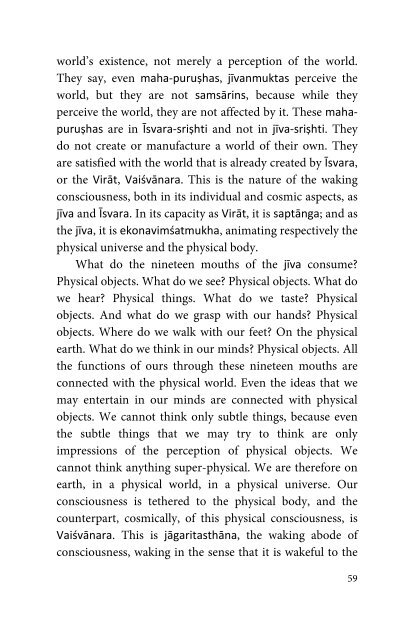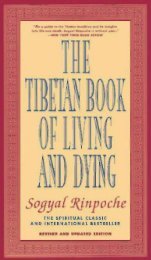Mandukya_Upanishad
Mandukya_Upanishad
Mandukya_Upanishad
You also want an ePaper? Increase the reach of your titles
YUMPU automatically turns print PDFs into web optimized ePapers that Google loves.
world’s existence, not merely a perception of the world.They say, even maha-puruṣhas, jīvanmuktas perceive theworld, but they are not samsārins, because while theyperceive the world, they are not affected by it. These mahapuruṣhasare in Īsvara-sriṣhti and not in jīva-sriṣhti. Theydo not create or manufacture a world of their own. Theyare satisfied with the world that is already created by Īsvara,or the Virāt, Vaiśvānara. This is the nature of the wakingconsciousness, both in its individual and cosmic aspects, asjīva and Īsvara. In its capacity as Virāt, it is saptānga; and asthe jīva, it is ekonavimśatmukha, animating respectively thephysical universe and the physical body.What do the nineteen mouths of the jīva consume?Physical objects. What do we see? Physical objects. What dowe hear? Physical things. What do we taste? Physicalobjects. And what do we grasp with our hands? Physicalobjects. Where do we walk with our feet? On the physicalearth. What do we think in our minds? Physical objects. Allthe functions of ours through these nineteen mouths areconnected with the physical world. Even the ideas that wemay entertain in our minds are connected with physicalobjects. We cannot think only subtle things, because eventhe subtle things that we may try to think are onlyimpressions of the perception of physical objects. Wecannot think anything super-physical. We are therefore onearth, in a physical world, in a physical universe. Ourconsciousness is tethered to the physical body, and thecounterpart, cosmically, of this physical consciousness, isVaiśvānara. This is jāgaritasthāna, the waking abode ofconsciousness, waking in the sense that it is wakeful to the59



